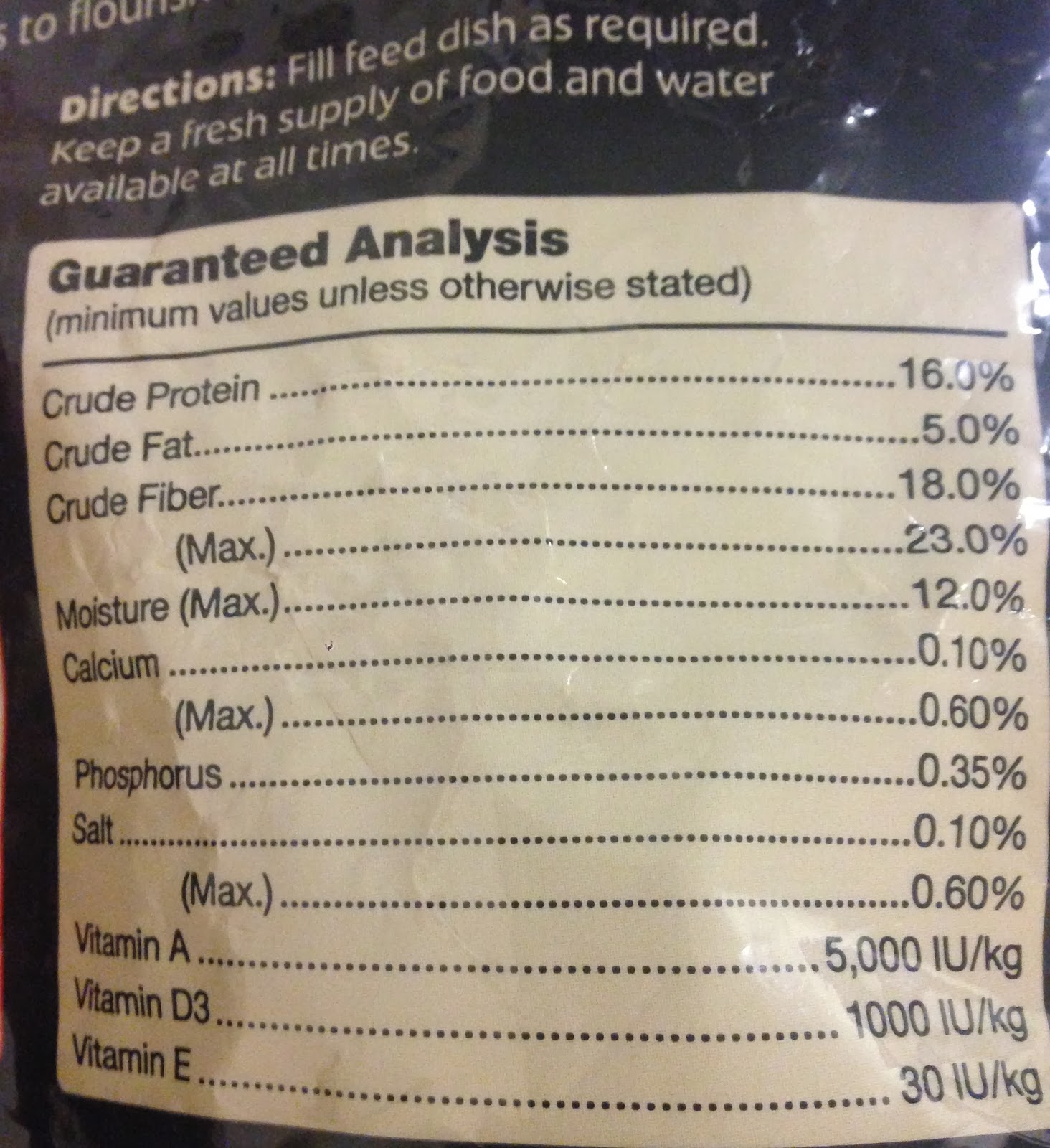Adult Rabbits
Pellets
Contrary to common beliefs pellets should not consist of an adult rabbit. The rule of thumb is typically 1/4 cup of pellets per 5 pounds of rabbits. I feed Leo every morning and fill up a 1/4 cup and then shake out some because Leo doesn't weigh 5 pounds. Leo gets Oxbow Bunny Basics for adults. This is a timothy hay based pellet which is perfect for adult rabbits (I don't recommend feeding alfalfa based pellets for adults because it is higher in protein and can lead to obesity). It is best to feed a food that is high in fiber and low in fat.
 |
| This is an example of a pellet mixture that is not healthy for rabbits. Rabbits will pick out all the treats and leave the pellets. |
 |
| This is the dietary information for the Oxbow Bunny Basics Adult food. I like this food because it has a hight fiber content and low in fat which is great for an adult rabbit. |
Adult rabbits should have hay available to them at all times and it should be the majority of their diet. Leo gets mostly timothy hay with some orchard grass mixed in. Mixing these two hays allows him to forage and get the nutritional benefit of both. Orchard hay tends to be a bit sweeter and softer than timothy hay. I put the hay in a hay rack positioned over his litter box because most rabbits like to munch and poop at the same time. Leo also gets a handful of hay in his litter box as an extra incentive to use it. Feeding alfalfa hay to adult rabbits can lead to obesity. Alfalfa also is higher in calcium levels which is correlated to bladder sludge (a painful condition similar to kidney stones).
Vegetables and Treats
The key to vegetables is variety and leafy greens. If you do both of these things then you are doing great! I feed Leo a handful of a mixture of lettuce (romaine, red/green leaf, NEVER iceburg) as well as some herbs like cilantro and parsley. Occasionally, he gets some Kale or other herbs but he has never taken to spinach. Leo normally gets his vegetable "salad" in the afternoon or early evening.
Treats should be given only in small amounts. Leo's favorites are small baby carrots and pieces of banana. As long as treats are given in moderation they are fine. The problem that people fall into is that rabbits are often labeled as "cute" and people want to keep feeding them treats. Feeding too many treats leads to obesity and other health problems. An obese rabbit is not a happy rabbit.
Here is a link to lists of Veggies and Treat options:
http://rabbit.org/suggested-vegetables-and-fruits-for-a-rabbit-diet/
Young Rabbits (between 2 months until 7-12 months)
Pellets
Baby or young rabbits that are still growing should have access to pellets at all times. These pellets should be alfalfa based and have no seeds or treats (just plain pellets). Ginny eats the Oxbow Young Rabbit food and she loves it. Every day I fill up her bowl with pellets and mix it around with any pellets left over from the previous day. I also check on her pellets before I go to bed because she eats them mostly at night.
When the rabbit reaches about 7 months old for dwarf breeds or a year for larger breeds they should be transitioned from their alfalfa pellets to an adult food that is timothy hay based. I plan on doing this with Ginny around 6 months because she is a dwarf breed and will be close to the end of her growing period. She will be switched to the same pellets that Leo is on (Oxbow adult rabbit food).
 |
| Note the directions on this food to have pellets available at all times. This is incorrect except for in young rabbits but this food was made for adult rabbits. |
 |
| This is the Oxbow Young Rabbit food that I feed Ginny. Look at the differences between the two foods especially the fiber and fat. |
For young rabbits hay should always be available and hay should be a majority of their diet. Young rabbits should be getting predominantly alfalfa hay. I feed Ginny mostly alfalfa with timothy hay in her litter box. Ginny also has a hay rack above her litter box full of timothy hay and some orchard hay. She has an additional bowl of alfalfa hay next to her pellets because alfalfa is so messy I like to keep it contained.
Once your rabbit is about 6 months old you can start transitioning them from alfalfa to only timothy or other grass hays. Ginny already gets some timothy hay. By the time the rabbit is about 7 months old they should only be eating timothy hay.
Vegetables and Treats
It is recommended that before 6 months old young rabbits should not be exposed to vegetables or fruit. Once they are about 4 months old though it is ok to occasionally introduce one vegetable at a time in small amounts. It is very important to only introduce one vegetable at a time and to monitor the consistency of their fecal pellets. If they soften exponentially or are runny then reduce the amount or discontinue that vegetable. Also look for signs of gas (hunched over, loud teeth grinding) as some vegetables like broccoli are more prone to causing it than others but every rabbit is different. See the link above for a good system for introducing young rabbits to new foods.
No comments:
Post a Comment